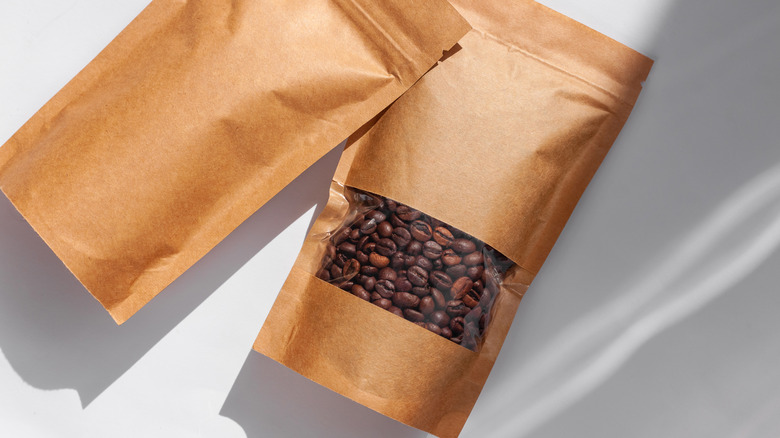Is It Okay To Store Coffee Beans In The Freezer?
There are a lot of rules about making coffee, so perfecting your morning mug may seem overwhelming at times. We get it. There's ample noise surrounding the coffee industry, and therefore ample choices to be made, even as early as the bean-buying process. There's a wide selection of coffee brands on the market, and selecting the best one for your own tastes can be difficult.
Even once you've picked your beans, you'll still have to strategize. Choose between whole beans or freshly ground ones, and then opt for your favorite brewing technique. Depending on your personal preference, you'll pick between the likes of a French press, moka pot, and the ever-polarizing AeroPress.
And yet, even more choices remain. Storing your coffee beans requires some forethought, as coffee tends to lose flavor shortly after it's been roasted. According to Chamberlain Coffee, instant coffee retains a longer shelf life than whole, raw coffee beans. If not stored properly, the latter typically only stays fresh for a week or two. When sealed, however, roasted coffee beans can last much longer, even up to a few months.
That timeline bodes well for fans of whole coffee beans, though deciding where to store them presents its own challenges. Freezing your coffee is a common suggestion, but this strategy's success rate is up for some debate. It's certainly a decent option, but it isn't exactly ideal.
The pantry is the best place to store coffee beans
In an ideal world, coffee lovers would consume their roasted coffee beans within a few days. Brewing beans in close proximity to their roasting date allows you to enjoy them at their most flavorful (via MasterClass). However, such a timeline isn't always feasible, especially when you have a larger bag of beans.
As such, you'll need to preserve your coffee beans, whose shelf lives, per Masterclass, hinge on two variables: Roast date and storage technique. If you're planning to keep beans on hand for quite some time, you'll need to heed the ticking clock. For maximum flavor and lifespan, beans should therefore be stored in the pantry, according to Real Simple. An airtight container that keeps out most light is best to retain freshness. Keeping coffee beans away from light, heat, and moisture likewise maximizes flavor. MasterClass ultimately cites dark places as the ideal location, but that doesn't mean coffee drinkers should ice out the freezer entirely.
Freezing coffee beans is a last resort for preserving the freshness of large batches
If you're planning to consume coffee beans within a few weeks, it's always best to stick with the pantry. You can also keep your beans in the freezer for up to three or four months before they lose flavor, but this should only be done when absolutely necessary (per MasterClass).
Coffee Bros cites two situations in which freezing coffee beans is your best bet. If you have more coffee than you can reasonably consume within a timeline of two to three weeks, pop your beans in the freezer. During this step, Real Simple warns coffee drinkers to divvy up their beans in smaller bags, so as to avoid taking coffee in and out of the freezer. Freezing coffee also offers an easy solution to savoring fancy and pricy beans, says Coffee Bros. If you want to prolong the lifespan of a particular batch, freezing allows you to conserve your beans and pull them out for special, shareable occasions.
Choosing when to freeze your coffee beans depends on your situation and timeline. But whatever you do, don't refrigerate your beans. According to MasterClass, refrigerated coffee tends to absorb its surrounding moisture and smells, rapidly losing its desired flavor and aroma. Whenever your beans need to chill, pop them in the freezer instead. No matter how cold they get, you can still get a delicious, steaming cup of coffee after thawing them out to room temperature.


